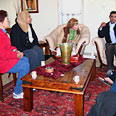
'Peace in the interest of both Arabs and Jews.’ Jews, Arabs in Umm al-Fahm home
צילום: מוטי אבירם
Conference: Fear of Arab-Israelis unfounded
'Connecting with Umm al-Fahm' conference focuses on prejudices, fears of visiting Arab-Israeli towns; ‘we can let the voices of fascism rise up, or make our voices heard,’ Jewish participant says. ‘There is a psychological barrier, but we are of the same ancestry,’ Palestinian adds
“We are here to stress the fact that we are Palestinian citizens of Israel, and we despise the winds of fascism that are emerging in the country,” said Nebras Chairman Camel Agbria at the opening of the 'Connecting with Umm al-Fahm' conference, which was held last Saturday in the Arab-Israeli city.
"The Israeli occupation corrupts, and peace is in the interest of both Arabs and Jews," he told the 150 Israeli Arabs and Jews assembled at the 'Al-Anis' event hall. "The bloodshed on both sides pains us all; if we invest less in war, we will have more to invest in the individual."
Founded in 2004, Nebras, an organization of Palestinians from Umm al-Fahm and the surrounding area, aims to 'promote equality, pluralism, tolerance and initiative' within the Arab-Israeli community and to 'advance joint Arab-Jewish activities in Israel.'
Dvora Levin, a member of a Jewish group that took part in organizing the conference, said its purpose was to "expose ourselves to people we have never met before and let them expose themselves to us." The group was set up some six years ago by several participants in the Landmark self-help forum.
'What would Abraham say?'
Fellow member Irit Gidron, an actress, told those on hand that she was "excited to see how many people want to become acquainted with Israel's Arabs."
"During the recent war in Lebanon I sat at home and found myself angry with my Arab friends," she recounted. "I thought to myself, 'Iranian President Mahmoud Ahmadinejad said he wanted to destroy Israel, so why are they not calling me?' I decided to call my friend Jamal, and he had something to say about his Jewish friends. So the purpose here is to open our hearts; in this way we can find many things in common --- a chance for partnership."
Gidron spoke of what she referred to as prejudices that obstruct efforts to improve Arab-Jewish relations in the country.
“My friend was afraid to come here – to Umm al-Fahm – and here she is; nothing happened to her,” she said. “Arabic is the second language in this country. We can let the voices of fascism rise up, or make our voices heard.”
Agbria added that, “There is a psychological barrier; many Jews were afraid to come here, but we are of the same ancestry, and throughout history both nations cooperated in many different fields.
Before the participants were divided into small groups and taken by their hosts to lunch and a local gallery displaying works by 50 Jewish and Arab artists from across the country, they heard a lecture by Dr. Mahamid Hatem of Haifa and Ben-Gurion universities on ‘Islamic Rule in the Middle Ages and its Treatment of the Other’.
“Imagine our father Abraham (father of Isaac and Ishmael) sitting in this room right now; he’d say, ‘where were you all these years? Why haven’t you talked to each other?’” Hatem said.










